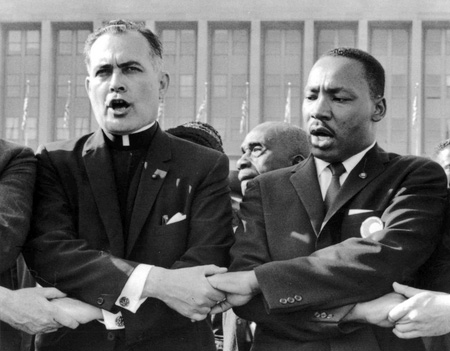“Zeal
for your house will consume me.” The
disciples remembered those words from scripture, we’re told. Well, they remembered wrong. The psalm they were thinking of doesn’t say
that. It says: “zeal for your house has
consumed me;” not ‘will.’ Their very
memory has started to be transformed by their encounter with Christ. Could they have understood what this renewal
of their minds meant yet? No, not
yet. But, when Jesus had been raised
from the dead… then they’d remember anew.
They’d remember scripture and remember Jesus’ words, seeing the two as
originating from the same source, and they’d believe. But now, they let themselves be so transfixed
by this encounter with zeal incarnate that their memory of scripture, a psalm
they must have sung hundreds of times, gets transformed.
“Zeal
for your house will consume me.” It
seems like a poetic way of saying, “I will be very zealous for your house,” the
future tense making clear that the psalm written centuries earlier finds its
most powerful expression in this man here and now, that they had begun to follow. ‘Consume’ is vibrantly energetic word that
fits perfectly for describing what zeal can do for and to us. Bl. Basil Moreau, the founder of the
Congregation of Holy Cross, defined zeal as “that flame of burning desire which
one feels to make God known, loved and served, and thus save souls.” Zeal is a fire. It burns.
It burned in the heart of Jesus, the fiery furnace of charity. This fire in his heart made present the zeal
of God for his people: “For I the Lord, your God, am a zealous God” we
could have rendered our first reading, just as well as ‘jealous.’ And he longs to set our hearts aflame with
that same fire.
“Zeal
for your house will consume me.” As
powerful as that is, it’s more than just a poetic way of saying, “I will be
very zealous.” It will consume him. There’s a straight line from this moment to when
Jesus expired his last, gave up his Spirit, was consumed by death. There’s a straight line from coming into
Jerusalem’s holiest place on the holiest feast and disrupting it with a strange
new hue of holiness incarnate, from that to having your body destroyed. Because that’s how zeal is treated in this
world. Cold and dark threaten fire. We know as Christians that the brightness of
zeal will not be overcome by the darkness, but that doesn’t make the threats
any less of a test, a trial. Zeal is the
fire that gives us the strength to reach out into those dark places, to trust
that God is reaching into ours and enlightening them. But it’s not cheap, it’s not safe.
This
week, we laid to rest Fr. Ted Hesburgh. University
president, civil rights leader, diplomat, priest, my brother. As a fellow son of Bl. Basil Moreau, he lived
out that zeal that Moreau longed to see in his community. Amongst all the eulogies and tributes we’ve
heard over the past week, I was struck maybe most by hearing some of the story
behind that famous photograph of Ted arm in arm with Martin Luther King. It was a photo that I’d always liked, of
course, that gave me some family pride, maybe, but, not having been around in
1964, there was a note to that photo that I’d always been somewhat tone deaf
to: the courage in it. I learnt this
past week that when King finally got through to Fr. Ted to invite him to the
rally in Soldier Field, it was only after he’d already been turned down by the
Chicago mayor’s office and the Archdiocese of Chicago. I learnt that when King invited him, Ted only
had one question: “what time should I show up?”
I was reminded in how many quarters, many of them quite outwardly
respectable, King was hated, either for what he stood for, or just for
being ‘uppity’ enough to stand for anything. I learnt how much hate mail Ted got for
linking arms with a fellow human, how many death threats he received because of
it. And it cost the university some
alumni support, but the death threats, thank God, were never acted on. King, of course, would not be so lucky in
that regard.
Ted
was willing to let zeal consume him.
That was his priesthood, expressed in that arm link as powerfully as in
his daily Mass. In that arm link, he
zealously made Christ present, Christ who let himself be consumed because of his
zeal, his burning desire to bring us back to God, to purify the locus through
which we related to God before he would eventually make the world his Temple,
the place where humanity encounters God.
In that arm link, Ted zealously brought the world to Christ, knowing
that he dare sing “we shall overcome” when all the earthly signs pointed
against such an outcome because Christ’s gift of self conquered the darkness of
hatred and alienation and enlightened the world. It is already overcome.
“Zeal
for your house will consume me.” Christ
acts zealously still, to purify our ways of relating to God. Here in this place, at this altar, Christ
lets himself be consumed anew. In one
symbolic act that Passover day, that feast of God’s liberation, Christ set into
motion a process that would transform and purify human worship. All the excitement and drama of animal
sacrifice in the Temple becomes a mere shadow of what we’re invited to here: we
are invited to the Last Supper, to the foot of the cross on Calvary and to the Heavenly
Banquet. And we’re told: here, consume.

No comments:
Post a Comment